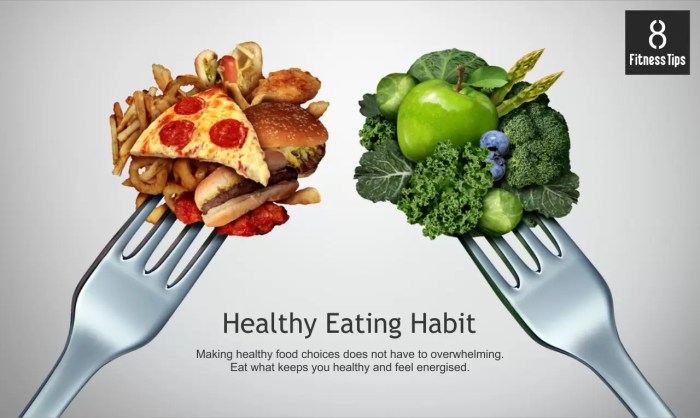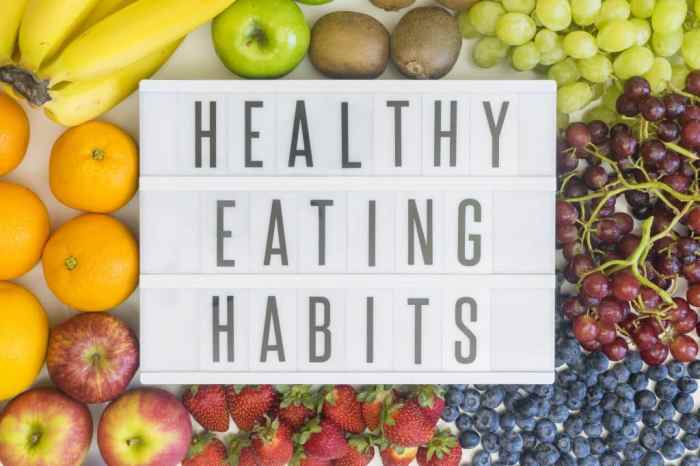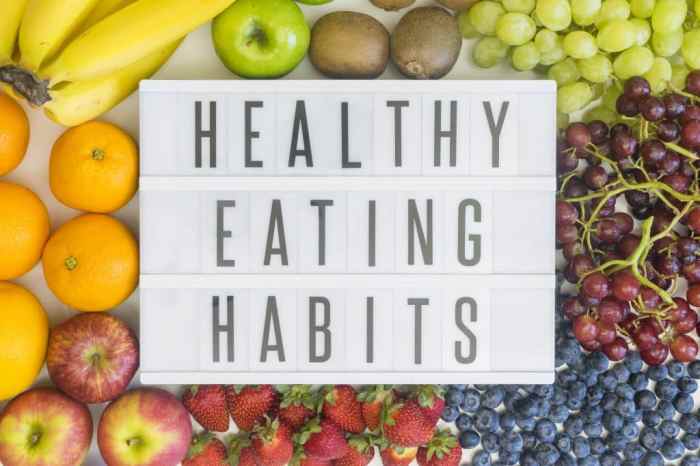Yo, let’s talk about Healthy Eating Habits – the real deal when it comes to keeping your body and mind in top shape. From boosting energy to improving mood, this topic is all about how what you eat affects every part of your life. Are you ready to dive in?
Importance of Healthy Eating Habits

Healthy eating habits are crucial for maintaining overall well-being. By consuming a balanced and nutritious diet, individuals can experience a wide range of benefits that positively impact their physical and mental health.
Physical Health Benefits, Healthy Eating Habits
- Improved immune function, reducing the risk of illnesses and infections.
- Healthy weight management, lowering the chances of obesity and related health issues such as heart disease and diabetes.
- Enhanced energy levels, promoting better performance in daily activities and exercise.
- Stronger bones and teeth, reducing the risk of osteoporosis and dental problems.
- Lowered risk of chronic diseases like cancer, stroke, and hypertension.
Mental Health Benefits
- Improved mood and mental well-being, reducing the likelihood of depression and anxiety.
- Enhanced cognitive function, supporting better concentration and memory retention.
- Reduced stress levels, leading to better overall mental resilience.
- Increased self-esteem and confidence, fostering a positive body image and mindset.
- Improved sleep quality, allowing for better rest and rejuvenation.
Components of a Healthy Diet

Eating a balanced and healthy diet is essential for overall well-being. It consists of various key components that provide the necessary nutrients for the body to function optimally.
Fruits and Vegetables
Including a variety of fruits and vegetables in your diet is crucial as they are rich in vitamins, minerals, antioxidants, and fiber. These nutrients help boost the immune system, improve digestion, and reduce the risk of chronic diseases.
Whole Grains
Whole grains like brown rice, quinoa, and whole wheat bread are excellent sources of complex carbohydrates, fiber, and essential nutrients. They provide sustained energy, promote satiety, and support digestive health.
Lean Proteins
Incorporating lean proteins such as chicken, fish, tofu, and legumes helps build and repair tissues, maintain muscle mass, and keep you feeling full. Protein is essential for various bodily functions and overall health.
Healthy Fats
Healthy fats found in foods like avocados, nuts, seeds, and olive oil are important for brain health, hormone production, and absorption of fat-soluble vitamins. They also help reduce inflammation and support heart health.
Hydration
Staying hydrated by drinking an adequate amount of water throughout the day is vital for overall health. Water helps regulate body temperature, transport nutrients, remove waste, and lubricate joints. Dehydration can lead to fatigue, headaches, and poor concentration.
Tips for Developing Healthy Eating Habits
Developing healthy eating habits is essential for overall well-being. Making small changes to your diet can have a big impact on your health in the long run. Here are some tips to help you transition to a healthier diet, plan nutritious meals, and practice mindful eating:
Transitioning to a Healthier Diet
Transitioning to a healthier diet can be challenging, but it is achievable with the right strategies:
- Start by gradually incorporating more fruits and vegetables into your meals.
- Replace sugary drinks with water or herbal teas.
- Choose whole grains over refined grains for better nutrition.
- Experiment with herbs and spices to add flavor to your dishes without relying on salt or unhealthy condiments.
Meal Planning and Preparation
Effective meal planning and preparation can make it easier to stick to a healthy eating routine:
- Plan your meals for the week ahead to ensure you have nutritious options readily available.
- Prep ingredients in advance to save time during busy weekdays.
- Choose simple recipes that are easy to make and packed with nutrients.
- Invest in quality kitchen tools and storage containers to make meal prep more efficient.
Mindful Eating and Portion Control
Mindful eating and portion control are crucial components of healthy eating habits:
- Practice mindful eating by savoring each bite, chewing slowly, and paying attention to hunger cues.
- Avoid distractions while eating, such as watching TV or using electronic devices.
- Use smaller plates and bowls to control portion sizes and prevent overeating.
- Listen to your body’s hunger and fullness signals to avoid mindless snacking.
Common Obstacles to Healthy Eating
Eating healthy can be challenging in today’s fast-paced world filled with tempting processed foods and busy schedules. However, overcoming these obstacles is crucial for maintaining a nutritious diet and overall well-being.
Lack of Time
One of the most common obstacles to healthy eating is the lack of time to prepare nutritious meals. Many people opt for fast food or pre-packaged meals due to their convenience.
- Plan ahead by meal prepping on weekends or evenings when you have more time.
- Choose quick and easy recipes that require minimal ingredients and preparation time.
- Utilize time-saving kitchen gadgets like a slow cooker or instant pot to make healthy cooking more efficient.
Food Accessibility
Another challenge is the availability of unhealthy food options in our environment, making it difficult to choose nutritious alternatives.
- Shop the perimeter of the grocery store where fresh produce, lean proteins, and whole grains are typically located.
- Avoid keeping tempting snacks or sugary treats in your home to reduce temptation.
- Pack healthy snacks like nuts, fruits, or yogurt to have on hand when hunger strikes.
Social Pressures
Social gatherings, peer influence, and cultural traditions can also present obstacles to healthy eating habits.
- Communicate your dietary preferences and goals to friends and family to receive their support.
- Suggest healthier restaurant options or offer to bring a nutritious dish to social events.
- Focus on enjoying the company and conversation rather than solely on the food at gatherings.
Consistency is Key
Consistency is essential in developing and maintaining healthy eating habits. It’s important to stay committed to your goals and make small, sustainable changes over time.
Remember, progress is progress no matter how small. Stay consistent and celebrate your achievements along the way!
